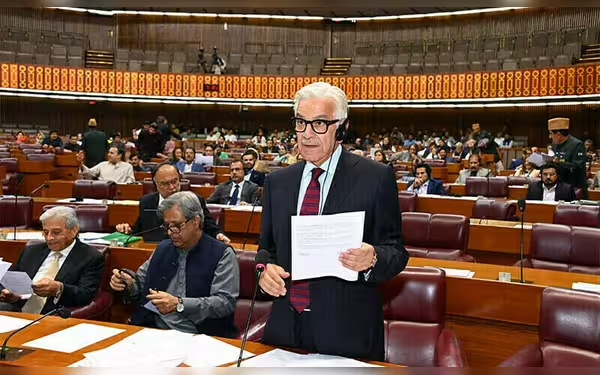Thursday, November 7, 2024 01:27 AM
Government's Legislative Focus on Military Tenure Raises Concerns
- Rapid passage of military tenure bills raises questions.
- Legislative process lacks thorough debate and consideration.
- Government prioritizes its challenges over citizens' needs.
 Image Credits: dawn
Image Credits: dawnThe government's recent legislative actions raise concerns over priorities, focusing on military tenure rather than pressing citizen issues.
The recent legislative actions taken by the government of Pakistan have raised eyebrows and sparked discussions across the nation. On a Monday evening, the law minister and defence minister hurriedly pushed through several significant bills, which included extending the tenure of armed forces chiefs to five years, with the option for another five-year extension. This rapid legislative process, completed in record time, has led many to question the priorities of the ruling coalition.
In just 24 minutes in the National Assembly and 16 minutes in the Senate, six bills were introduced and passed. This haste suggests a lack of thorough consideration and debate, which are essential components of a healthy legislative process. The government has often emphasized the "supremacy of parliament," yet their actions seem to indicate a different allegiance. The opposition was not given a fair chance to voice their opinions, which could have fostered a more respectful legislative environment.
The decision to extend the military chiefs' service tenure was unexpected. Government representatives later took to national media to justify this move, claiming it would stabilize the appointment process for army chiefs. However, one must wonder why these justifications were not presented during the parliamentary discussions. The speed of the legislative process raises concerns that these explanations were merely an afterthought.
While a five-year tenure for service chiefs might bring some stability and continuity to military policies, the rationale behind extending service extensions for another full tenure remains unclear. Such extensions are typically reserved for special circumstances, and the need for this change is questionable.
Moreover, the government's push to increase the number of judges in the higher courts is puzzling, especially considering the recent amendments that have limited the powers of the superior judiciary. The backlog of court cases, which the government frequently cites as a reason for its interference in the judicial system, is predominantly found at the lower levels of the judiciary. Yet, no legislative measures have been introduced to address this issue, while the powers of the superior courts continue to be diminished.
Overall, the government's legislative agenda appears to be more focused on addressing its own challenges rather than tackling the actual problems facing the country. This raises the question: when will the government shift its focus to the pressing issues that affect the everyday lives of citizens? One can only hope that lawmakers will soon feel more secure in their positions and prioritize the needs of the people over their own interests.
The recent legislative developments highlight a concerning trend in Pakistan's governance. The speed and nature of these decisions suggest a disconnect between the government and the citizens it serves. As the nation moves forward, it is crucial for lawmakers to engage in meaningful dialogue and address the real issues that impact the lives of the people. Only then can trust in the legislative process be restored, and the true spirit of democracy be upheld.













